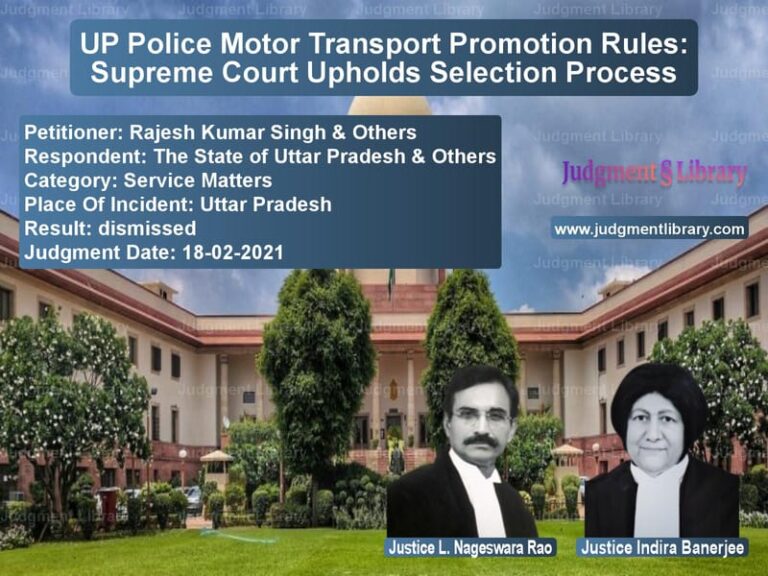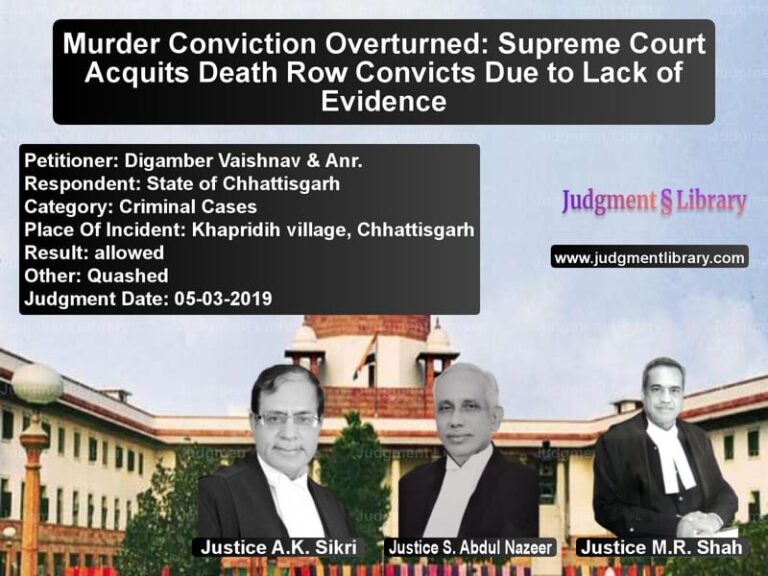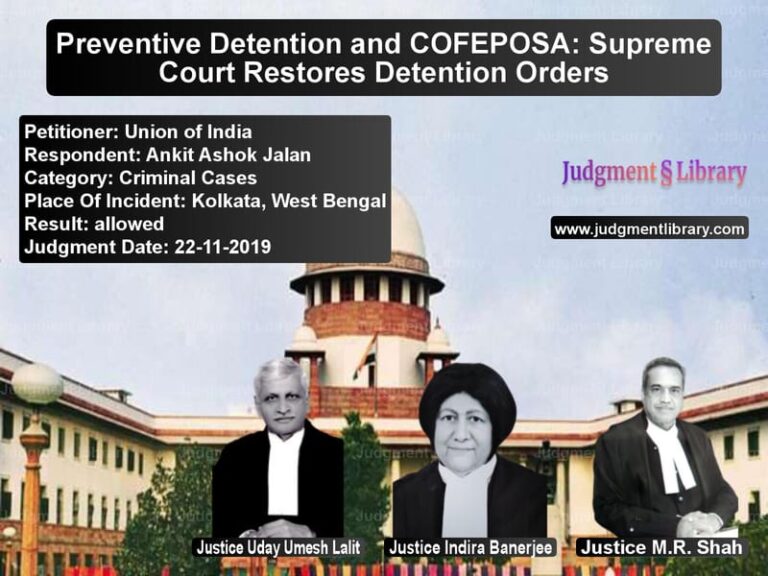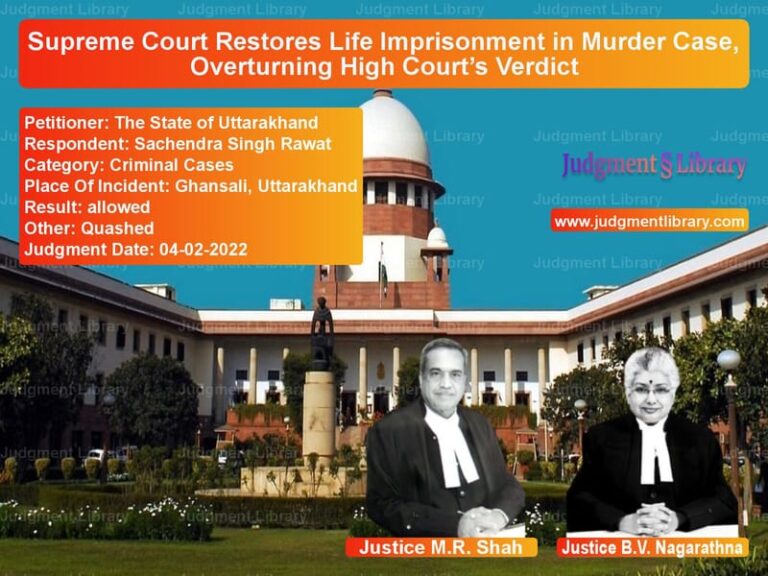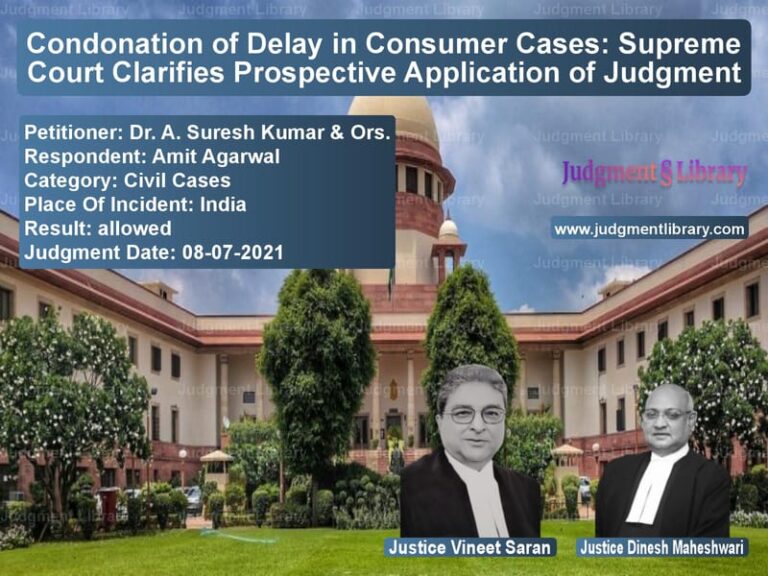Terrorism Case and Default Bail: Supreme Court Upholds High Court’s Decision
The Supreme Court of India, in the case of Union of India vs. Mubarak @ Muhammed Mubarak, addressed a significant legal question concerning the grant of default bail in a case registered under the Unlawful Activities (Prevention) Act, 1967 (UAPA). The Court considered whether the Special Court’s extension of judicial detention beyond 90 days complied with the statutory requirements of Section 43D(2)(b) of UAPA. The Supreme Court ultimately refused to interfere with the High Court’s decision, which had granted bail to the accused.
This judgment clarifies the procedural safeguards necessary for extending detention under UAPA and sets a precedent regarding judicial oversight in terrorism-related cases.
Background of the Case
The case arose from the murder of Sasikumar, a spokesperson of Hindu Front, who was brutally attacked by unidentified assailants on September 22, 2016, at around 11:15 PM in Coimbatore. Following this incident, widespread violence erupted, leading to the registration of over 237 criminal cases related to arson, stone pelting, and attacks on police vehicles and religious institutions.
Given the sensitivity of the case, the Director General of Police (DGP), Tamil Nadu, transferred the investigation to the Special Investigation Division (SID) of CB-CID on September 27, 2016. Later, the Central Government, under Sections 6 and 8 of the NIA Act, transferred the investigation to the National Investigation Agency (NIA), which formally took over the case on January 22, 2018. The accused, Mubarak, was arrested on December 25, 2017.
Legal Issues in the Case
The Supreme Court examined the following legal questions:
- Was the Special Court’s extension of detention under Section 43D(2)(b) of UAPA legally valid?
- Did the High Court err in granting default bail?
- Once default bail is granted, can it be overturned?
Arguments by the Appellant (Union of India)
The prosecution, represented by the Special Public Prosecutor, argued:
- The Special Court had correctly extended the accused’s detention beyond 90 days based on a detailed report by the Special Public Prosecutor.
- The report highlighted the complexity of the investigation, including the need to analyze over 2,500 call data records, 350 witness statements, and 50 CCTV footage recordings.
- The investigation involved a potential larger conspiracy requiring international cooperation under the Mutual Legal Assistance Treaty (MLAT) with the United States.
- The High Court failed to consider that procedural compliance was met, and the accused should not have been granted default bail.
Arguments by the Respondent (Mubarak @ Muhammed Mubarak)
The defense countered:
- The prosecution failed to provide sufficient legal grounds for extending detention.
- The reasons cited in the Special Public Prosecutor’s report, while relevant for the investigation, did not justify the accused’s prolonged detention.
- The Madras High Court correctly ruled that the extension order did not meet the legal requirements of Section 43D(2)(b) of UAPA.
- The accused had been in custody for an extended period, and the principles of natural justice necessitated granting bail.
Supreme Court’s Key Observations
The Supreme Court carefully examined the facts and made the following key observations:
1. Compliance with Section 43D(2)(b) of UAPA
- The Court acknowledged that the Special Court had reviewed the Special Public Prosecutor’s report and recorded its satisfaction before extending detention.
- However, the High Court held that the justification provided in the report was not legally sufficient to deny default bail.
2. The Grant of Default Bail Was Procedurally Correct
- The Supreme Court noted that once an accused secures default bail due to procedural lapses, it cannot be revoked unless there are exceptional circumstances.
- Since Mubarak had already been released on default bail, overturning it would set a problematic precedent.
3. The Prosecution Can Apply for Bail Cancellation If Needed
- The Court clarified that the prosecution retains the right to seek cancellation of bail in case of future violations.
- The Special Court was directed to expedite the trial and conclude it by March 2020.
Final Judgment
The Supreme Court ruled:
- While the prosecution’s arguments were legally sound, the High Court’s decision granting default bail would not be overturned.
- The NIA could move for bail cancellation if required.
- The trial must be expedited to ensure a swift resolution.
Implications of the Judgment
This ruling has significant implications for counterterrorism investigations and procedural safeguards:
1. Reinforcement of Procedural Fairness
- The ruling reaffirms that procedural lapses in extending detention can lead to default bail.
- Courts will closely scrutinize prosecution requests for extending custody beyond 90 days.
2. Balancing National Security and Legal Rights
- The judgment ensures that anti-terror laws are applied fairly while protecting the accused’s fundamental rights.
- Law enforcement agencies must provide compelling reasons for prolonged detention.
3. Clarification on Default Bail Under UAPA
- The judgment establishes that once an accused is granted default bail, it cannot be easily overturned.
- The prosecution’s remedy lies in seeking bail cancellation based on fresh grounds.
Conclusion
The Supreme Court’s ruling in Union of India vs. Mubarak @ Muhammed Mubarak sets a crucial precedent in UAPA cases. It upholds procedural safeguards while recognizing the government’s need to conduct extensive investigations in terrorism-related cases. By ensuring fair application of detention laws, the Court reinforces the balance between national security and individual rights.
Petitioner Name: Union of India.Respondent Name: Mubarak @ Muhammed Mubarak.Judgment By: Justice A.M. Khanwilkar, Justice Ajay Rastogi.Place Of Incident: Coimbatore, Tamil Nadu.Judgment Date: 07-05-2019.
Don’t miss out on the full details! Download the complete judgment in PDF format below and gain valuable insights instantly!
Download Judgment: Union of India vs Mubarak @ Muhammed M Supreme Court of India Judgment Dated 07-05-2019.pdf
Direct Downlaod Judgment: Direct downlaod this Judgment
See all petitions in Terrorist Activities
See all petitions in Bail and Anticipatory Bail
See all petitions in Extortion and Blackmail
See all petitions in Judgment by A M Khanwilkar
See all petitions in Judgment by Ajay Rastogi
See all petitions in dismissed
See all petitions in Stayed
See all petitions in supreme court of India judgments May 2019
See all petitions in 2019 judgments
See all posts in Criminal Cases Category
See all allowed petitions in Criminal Cases Category
See all Dismissed petitions in Criminal Cases Category
See all partially allowed petitions in Criminal Cases Category


